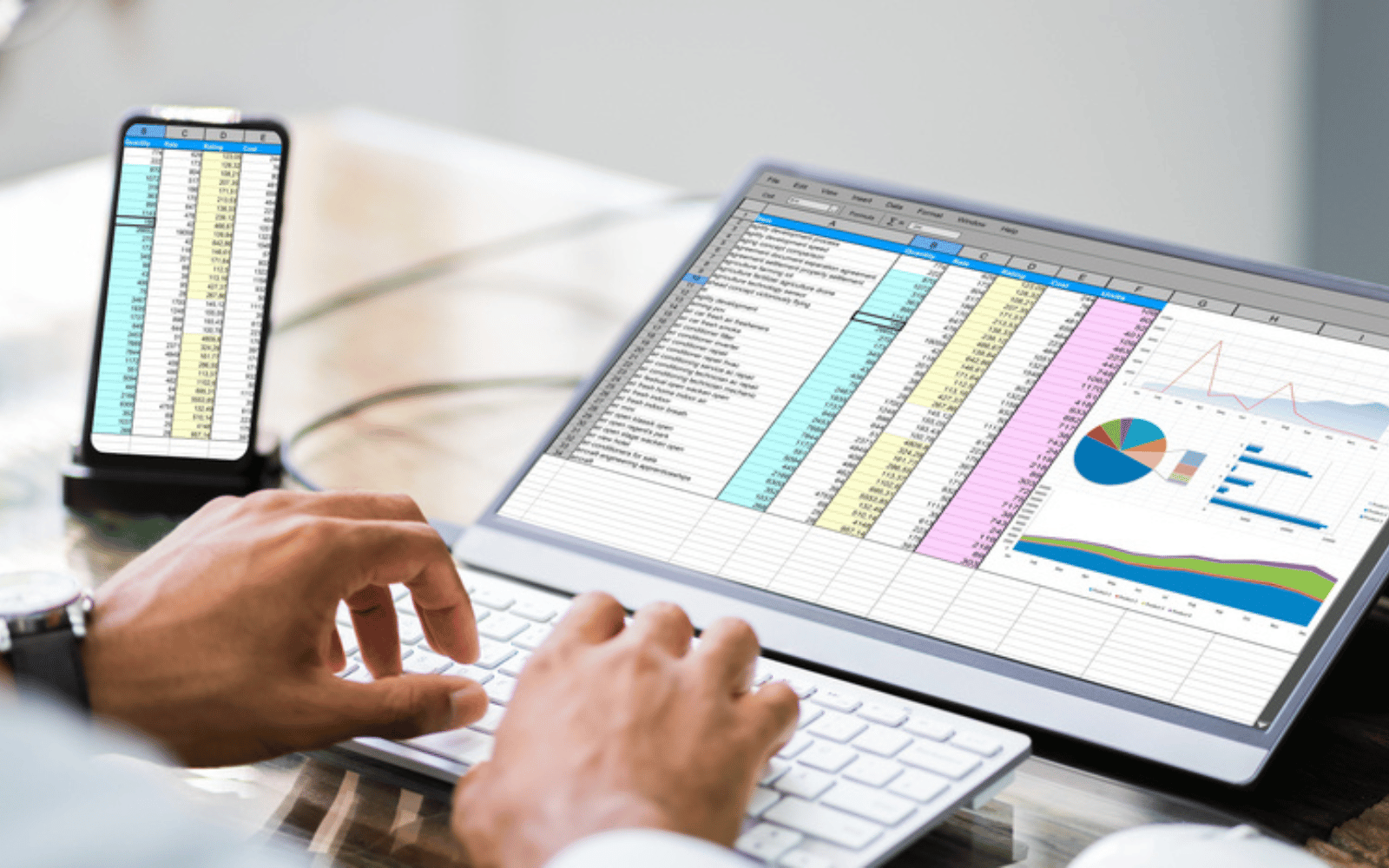It really does seem there’s an app for everything these days.
For your music, your workouts… even to find someone to walk your dog. For whatever fantastical use you can dream up, there’s an app for it.
And spreadsheets are no exception.
But with a sea of spreadsheet apps available for iPhone users, how do you choose the right one? In the end, there’s no best spreadsheet app. However, with a bit of digging and a little help, it’s possible to find the best one for you.
Finding a Great Spreadsheet App Is Easy
Getting personal or professional business done no longer means you’re locked in front of a desktop computer all day.
Sore from sitting down for eight hours a day? Dying for a change of scenery? Need to stay on the go?
The answer you’re looking for may be in an app.
Sure, you’re working with a smaller screen and spreadsheet apps won’t always be for everyone. However, their easy accessibility and portability make them ideal for some.
Not only are there a vast amount of spreadsheet apps available today but they’re high quality, too. It’s quick and easy to find an app to suit your needs.
What to Look for in Spreadsheet Apps
Which app is best for you depends on what you want to get out of it. Do you have a large business and require robust customization and many functions? You probably need Microsoft Excel’s app.
Newbie working on a budget who needs something simple that works? Apple Numbers is likely more up your alley.
When choosing the best app for your spreadsheet needs, consider the following:
- Learning curves.
- Budget.
- The number of features and functions required.
- Storage needs.
Knowing what your needs are is the first step to choosing the best spreadsheet app for you.
What’s the Best Spreadsheet App for iPhone?
The number of apps out there can be simply overwhelming.
To help you out, here’s a list of my top five spreadsheet apps with their pros and cons.
1. Microsoft Excel
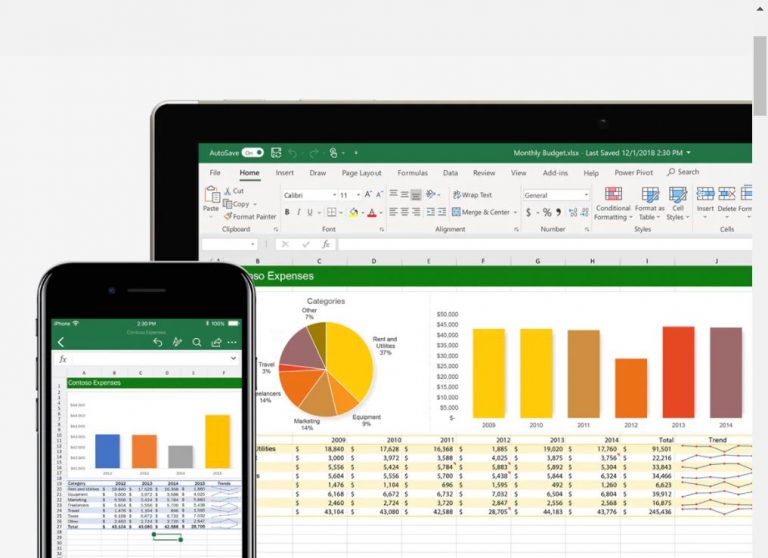 Image from Microsoft, April 2024
Image from Microsoft, April 2024Cost: ~$100/yr
Pros:
- Large number of functions.
- Extremely customizable charts.
- Great for collaboration.
Cons:
Microsoft Excel now has an app available on iOS and Android.
Worry not. Just because Excel is now also an app doesn’t mean it doesn’t have high functionality.
Compared to other spreadsheet apps, Microsoft Excel does come at a steep price as you’ll need a license to use it. Depending on your needs, however, this app may still be well worth it.
Work with a team you need to communicate with?
Excel has solid collaboration features that make things easy, including comments and history tracking. Its massive number of functions make it a huge competitor on this list for those who require them.
The downside? With all of its functionality and ways to use it, the Microsoft Excel app comes with a steep learning curve. Because of this, it may not be the best spreadsheet app for beginners.
Looking for something a looking simpler? Keep reading.
2. Google Sheets
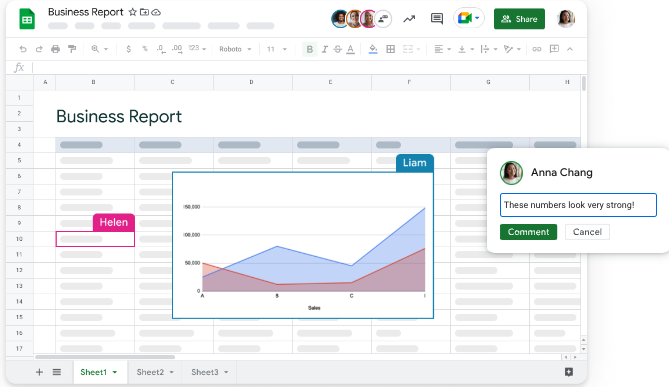 Image from Google Sheets, April 2024
Image from Google Sheets, April 2024
Cost: Free up to 15 GB of storage
Pros:
- No software needed.
- Easy to use.
- Formula tooltip.
Cons:
- Can’t make as many chart types as Excel.
- Charts can’t be edited outside of the app.
It’s neck-and-neck with Microsoft Excel for being one of the greatest spreadsheet apps out there. Google Sheets offers various unique benefits.
Two features are at the top of the list: its cost and storage.
Yes, Google Sheets is completely free for up to 15 GB of storage. Even if you require more extensive storage, their rates are fairly reasonable.
Also unique from Excel is Google Doc’s cloud storage. There’s no need to clog up your device with documents.
Another bonus? There isn’t any software to download.
Google Sheets also has fantastic collaboration tools, including chat, comments, real-time co-editing, and simple sharing. Here’s another app that can keep you effortlessly connected.
For newbies, Google Sheets is going to be your ideal app. It has an interface that’s easy to use – plus a clean interface that’s pleasing to the eye.
On top of that, Sheets comes with a helpful formula tooltip to provide definitions and arguments.
Google Sheets, just like any app, isn’t perfect. There aren’t quite as many types of charts as Excel, and they can’t be edited outside the app, as in Word.
Still, it has a great number of useful functions for a free app.
3. Apple Numbers
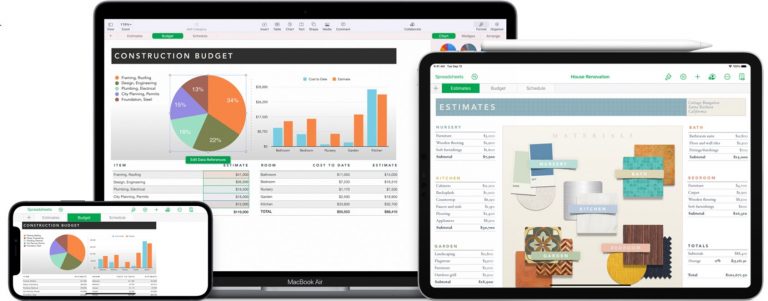 Image from Apple Numbers, April 2024
Image from Apple Numbers, April 2024Price: Free (comes pre-installed on Macbooks)
Pros:
- Clean, modern interface.
- Comes equipped with templates.
Cons:
- Lacks some key features.
- Not available for Android.
Many use the Apple Numbers app for one reason: it comes already pre-installed on their Macbooks. Even better, the app is free even if you don’t have a Macbook.
However, Apple Numbers is predictably only available for iOS. That’s a bummer for Android users.
Many have applauded Apple Numbers for its sleek look. Numbers loads as an infinite blank canvas you can place tables onto, in stark contrast to Excel’s busy, pre-made design.
This is another great choice for beginners starting to use spreadsheets. Apple Numbers comes equipped with pre-built templates to help you quickly finish everyday tasks.
On the negative side, this spreadsheet app does not come with data analysis compatibility and is not able to manage large data sets.
Therefore, Apple Numbers may not be the best choice for business owners who need to process a large amount of data.
4. LibreOffice
 Screenshot from LibreOffice, April 2024
Screenshot from LibreOffice, April 2024Price: Free
Pros:
- Completely free and open source.
- Simple-to-create graphs.
- Easy function building.
Cons:
- No collaborative tools.
- Interface is outdated.
A community-driven and developed software, LibreOffice was created by The Document Foundation as a not-for-profit project. Their goal was to create accessible software that everyone could use, and they largely succeeded.
LibreOffice is open source, meaning it’s made freely available and can be modified or redistributed. This also means the app is fantastic for those seeking to customize their app who are on a tight budget.
The app additionally boasts the ability to process large amounts of information.
Another app that works well for beginners, LibreOffice has made function building painless with an easy step-by-step guide. Graphs are also simple to create; you no longer have to pull your hair out while working on what should be a simple product.
On the downside, as it hasn’t been updated in a while, the interface is outdated with a cluttered view. This makes the app more cumbersome to navigate.
Still, you have to remember LibreOffice has about 300 features, all stuffed into one app. It’s going to be a little cluttered.
5. Zoho Sheets
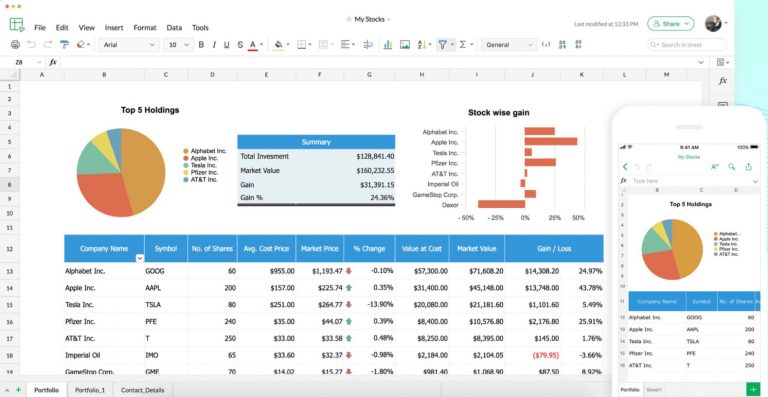 Image from Zoho Sheets, April 2024
Image from Zoho Sheets, April 2024Price: Free (up to 5 GB)
Pros:
- Has many functions.
- Easily imports data.
- Great formula builder.
Cons:
- Advanced features are hidden in menus.
- Fewer chart types.
Last on the list, but not least, Zoho Sheets has much to offer. It has a ton of available functions and easily imports data, including feeds.
The app also has a noteworthy formula builder with function descriptions, unlike Google Sheets. On the other hand, like Google Sheets, it’s free (up to a point) and cloud-based, so you can save storage on your device.
Even Microsoft Excel is given a run for its money when it comes to functions.
Zoho Sheet features over 350 functions, fiercely challenging their primary rival, Excel. This app also has some fantastic collaboration features, including; chat, real-time co-authoring, and sharing permissions.
Their charts have upsides and downsides. Although Zoho Sheets has fewer chart types than some of its competitors, the charts they do have are easy to create and customize. Not perfect for those who need to do more intricate projects, but suitable for a newbie.
Where Zoho Sheet falters is their navigability. Many advanced features are hidden in the menus, making them arduous to access. Work may be slower, although you’ll have access to more tools.
Conclusion
In a quickly evolving work scene, it can feel hard to catch up. Why not let an app make your life easier?
Spreadsheet apps can be perfect for business owners, workers, or anyone who really just needs to stay organized.
Depending on what you can afford, what functions you need, and what storage, there’s going to be a perfect app for you somewhere out there.
It’s all a numbers game.
More Resources:
Featured Image: Andrey_Popov/Shutterstock
FAQ
What factors should you consider when choosing a spreadsheet app for iPhone?
With the numerous spreadsheet applications available for iPhone users, selecting the right one hinges on several key considerations. It is vital to assess your unique requirements and preferences to make an informed choice. Here are the integral factors to bear in mind:
- Learning Curve: How easy is the app to use, and how much time are you willing to invest in learning it?
- Budget: What is your financial threshold? Free apps may suffice for basic needs, while paid versions offer more advanced features.
- Features and Functions: Determine the complexity of the functions you need for your tasks. Some may need robust customization options for extensive data manipulation.
- Storage Needs: Assess the amount of data you plan to handle and whether the app provides adequate storage options, either locally or in the cloud.
How does Microsoft Excel’s app for iPhone cater to collaborative needs?
Microsoft Excel’s app for iPhone is designed to accommodate the collaborative needs of various user groups, which is particularly beneficial for teams that require strong communication channels. Key features include:
- Collaborative Tools: Real-time co-editing, comments, and history tracking enable team members to work together effectively from different locations.
- Cloud Integration: With cloud capabilities, sharing updates and accessing the latest version of a document can be done seamlessly.
- High Functionality: Excel’s wide array of functions makes it suitable for handling complex datasets and various analytical tasks, which are crucial for enterprise-level collaboration.
What advantages does Google Sheets offer over other spreadsheet apps?
Google Sheets stands out among spreadsheet apps due to its unique combination of features and accessibility. Here are the advantages that elevate its user experience:
- Cost and Storage: Google Sheets is free for up to 15 GB of storage, with reasonable pricing for additional space.
- Cloud-Based: It operates entirely in the cloud, negating the need for local storage on your device.
- Accessibility: No software downloads are required, making it readily accessible across multiple devices.
- Collaboration: Stellar collaborative tools like chat functionality, real-time co-editing, and easy sharing options streamline teamwork.
- User-Friendly Interface: With an intuitive and aesthetically pleasing interface, Google Sheets is ideal for beginners and those who appreciate simplicity.
Are there any downsides to using Apple Numbers on the iPhone?
While the Apple Numbers app is renowned for its ease of use and sleek design, there are some limitations to consider before adopting it as your go-to spreadsheet app:
- Limited Feature Set: Certain advanced features may be lacking, which could hinder complex data analysis.
- Platform Restrictions: Apple Numbers is only available on iOS, excluding Android users from its potential user base.
- Data Handling Limitations: The app is not ideally suited for managing large datasets, which could be a significant drawback for business owners and power users.
